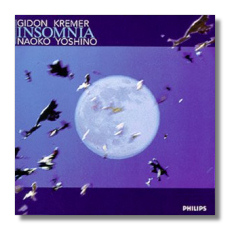
The Internet's Premier Classical Music Source
Related Links
- Latest Reviews
- More Reviews
-
By Composer
-
Collections
DVD & Blu-ray
Books
Concert Reviews
Articles/Interviews
Software
Audio
Search Amazon
Recommended Links
Site News
 CD Review
CD Review
Insomnia

- Michio Miyagi: Haru no umi
- Kaija Saariaho: Nocturne
- Tōru Takemitsu: Stanza II
- Yuji Takahashi: Insomnia
- Erik Satie: Le fils des étoiles
- Jean Françaix: 5 piccoli duetti
- Richard Strauss: Daphne - Etüde in G Major
- John Cage: 6 Melodies
- Arvo Pärt: Spiegel im Spiegel
- Nino Rota: Il padrino
- Alfred Schnittke: Suite in the Old Style
Gidon Kremer, violin
Naoko Yoshino, harp
Philips 456016-2 DDD 78:10
What's next, an album titled "Dyspepsia"? Actually, there's already a connection between music and insomnia – think of J.S. Bach's Goldberg Variations, which were written to sweeten the sleepless nights of a nobleman. If you're going to lie awake during the wee hours, you might as well as have something to entertain you. Lullabies might be too mocking, but a program of music that is quiet but not sedative might be just the thing. If I were having trouble sleeping, I think I might want to have Insomnia.
A man named Wilhelm Hellweg is credited as the recording producer and balance engineer, as well as with artist and repertoire production. If Insomnia was indeed his creation, he deserves recognition for assembling and harmonizing its separate parts. As the booklet notes assert, cultural differences related to time and geography sometimes are surprisingly small. We can have more in common with someone half a world and half a century away than with the man who lives across the hall from us, or who works in the next cubicle. This disc draws a surprisingly smooth line between Haru no umi by Michio Miyagi (1894-1956) and an excerpt from Suite in the Old Style by Alfred Schnittke (1934-1998), with stops along the way for the likes of John Cage (Six Melodies) and Richard Strauss. Erik Satie (the Prélude from Le fils des étoiles) and Jean Françaix (Cinque piccoli duetti) represent the French, often a bridge between the West and the East. Arvo Pärt's Spiegel im Spiegel is the almost inevitable nod to spiritual minimalism of the Eastern European school. The contrasts throughout are fun, not shocking. The music is eclectic and attractive, even if it isn't always conventionally "beautiful." The funny noises of Takemitsu, Takahashi, and Cage are no more alarming than those of a house settling on its foundation.
Most of the works on Insomnia are played by harp and violin together, although several are arrangements of works originally written for flute and harp, or for violin and piano. For variety, there are harp solos (Tōru Takemitsu's Stanza II, which nevertheless has a part for pre-recorded tape, Nino Rota's theme to "The Godfather") and solos for violin (Kaija Saariaho's Nocturne, Richard Strauss's "Daphne" Étude, derived from the opera of the same name).
Gidon Kremer has a nose for unusual projects, and I was not surprised to find him here. Not only does he play the violin, he lends his speaking voice to words concerning the Russian poet Osip Mandelstam in Yuji Takahashi's Insomnia, which, at 14 minutes, is the longest work on this disc. He adapts to the different playing styles – from austere to rich – with ease. Harpist Naoko Yoshino also lends her voice to the title-work, where she also plays a traditional Japanese harp called the kugo. She too is adept at meeting the challenges posed by this CD's polystylism. The recording does tend to give Kremer the upper hand, however.
The verdict: don't take sleeping pills, just enjoy your Insomnia. It's all too rare in the increasingly conventional world of classical recordings.
Copyright © 2000, Raymond Tuttle




















